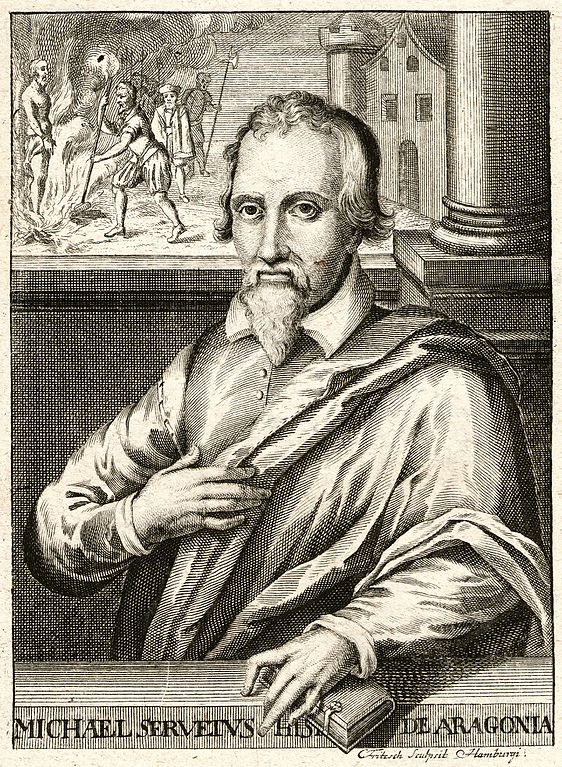Michael Servetus
Michael Servetus (29 September 1509 or 1511 – 27 October 1553) was a Spanish theologian, physician, cartographer, and Renaissance humanist. He was the first European to correctly describe the function of pulmonary circulation, as discussed in Christianismi Restitutio (1553).
He was a polymath versed in many sciences: mathematics, astronomy and meteorology, geography, human anatomy, medicine and pharmacology, as well as jurisprudence, translation, poetry, and the scholarly study of the Bible in its original languages. Servetus is renowned in the history of several of these fields, particularly medicine. He participated in the Protestant Reformation, and later rejected the Trinity doctrine and mainstream Catholic Christology. After being condemned by Catholic authorities in France, he fled to Calvinist Geneva where he was denounced by Calvin and burned at the stake for heresy by order of the city's governing council.
Early life
Michael Servetus was born in Tudela, Kingdom of Navarre. He attended the University of Toulouse in 1527, where he studied law. After an interval, Servetus returned to Paris to study medicine in 1536. After his studies in medicine, Servetus started a medical practice.
Dispute with John Calvin
In 1553 Michael Servetus published another religious work with further anti-trinitarian views entitled Christianismi Restitutio (The Restoration of Christianity), a work that sharply rejected the idea of predestination as the idea that God condemned souls to Hell regardless of worth or merit. God, insisted Servetus, condemns no one who does not condemn himself through thought, word, or deed. This work also includes the first published description of the pulmonary circulation in Europe.
To John Calvin, who had written his summary of Institutes of the Christian Religion, Servetus' latest book was an attack on historical Nicene Christian doctrine and a misinterpretation of the biblical canon. Calvin sent a copy of his own book as his reply. Servetus promptly returned it, thoroughly annotated with critical observations. Calvin wrote to Servetus, "I neither hate you nor despise you; nor do I wish to persecute you; but I would be as hard as iron when I behold you insulting sound doctrine with so great audacity."
In time, their correspondence grew more heated until Calvin ended it. Servetus sent Calvin several more letters, to which Calvin took offense.
Imprisonment
On 16 February 1553, Michael Servetus while in Vienne, France, was denounced as a heretic by Guillaume de Trie (a rich merchant who had taken refuge in Geneva and who was a good friend of Calvin) in a letter sent to a cousin, Antoine Arneys, who was living in Lyon.
On behalf of the French inquisitor Matthieu Ory, Michael Servetus and Balthasard Arnollet, the printer of Christianismi Restitutio, were questioned, but they denied all charges and were released for lack of evidence. On 26 March 1553, the letters sent by Michael to Calvin and some manuscript pages of Christianismi Restitutio were forwarded to Lyon by De Trie. On 4 April 1553, Servetus was arrested by Roman Catholic authorities and imprisoned in Vienne. He escaped from prison three days later. On 17 June, he was convicted of heresy, "thanks to the 17 letters sent by John Calvin, preacher in Geneva" and sentenced to be burned with his books.
In his absence, he and his books were burned in effigy (blank paper for the books).
Servetus inexplicably stopped in Geneva enroute to Italy, where Calvin had him imprisoned, and all his property was confiscated. French Inquisitors asked that Servetus be extradited to them for execution. Calvin wanted to show he was as firm in defense of Christian orthodoxy as his usual opponents. "He was forced to push the condemnation of Servetus with all the means at his command." At his trial, Servetus was condemned on two counts for spreading and preaching Nontrinitarianism, specifically, Modalistic Monarchianism (or Sabellianism) and anti-paedobaptism (anti-infant baptism).
Death
Calvin believed Servetus deserved death because of what Calvin termed, "execrable blasphemies."
On 27 October, Servetus was burnt alive atop a pyre of his own books at the Plateau of Champel at the edge of Geneva. Historians record his last words as: "Jesus, Son of the Eternal God, have mercy on me."
